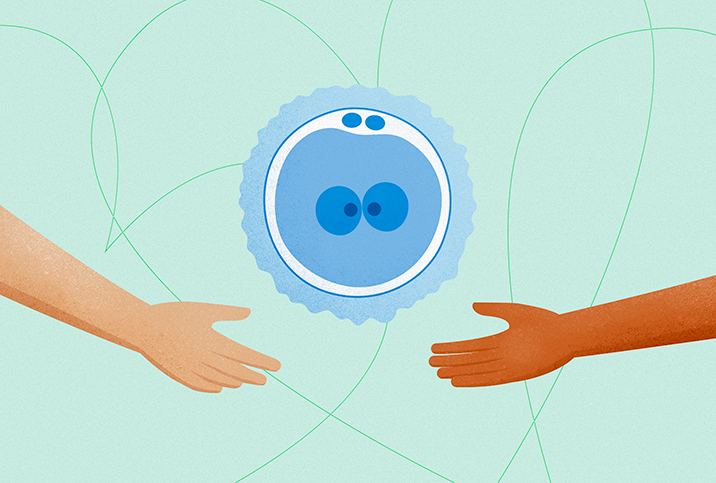The Importance of Preconception Care for Hopeful Parents

While it's common for women not to know they are expecting right away, parents who are planning for pregnancy can take steps to ensure a healthy pregnancy and delivery. A knowledgeable specialist can follow up on your family health issues, go over your gynecological history, provide advice on vitamin products to take and offer emotional support.
If you plan to have a baby in the near future, you should seek preconception care. This preconception visit is important to prevent complications during pregnancy and health problems for your newborn. If you previously had a baby, it is important to see your healthcare provider, too, because your medical status may have changed.
What medical professionals recommend
Obstetric complications in past pregnancies, as well as previous premature birth or miscarriage, are warning signs for health professionals. By knowing your situation at an early stage, a doctor can advise you on the best steps to take.
The first weeks of gestation are critical for the development of the fetus. This is a period of vulnerability to certain factors, such as medications and alcohol.
Planning can ensure that lifestyle and medical issues are reviewed as a form of prevention. Ravina Bhanot, M.D., an OB-GYN based in London and the founder of Zonas Fertility, explained some of the reasons you should seek preconception care:
- Review your medication to ensure no drug will affect your baby
- Check which vaccinations you need
- Receive counseling on alcohol, smoking and drugs
- Discuss exercise before and during pregnancy
- Receive advice on folic acid
"During preconception, we typically discuss diet/exercise prior to pregnancy and continuing this while pregnant," said Vonne Jones, M.D., an OB-GYN at Total Women's Care in Houston. "We also review past medical history and review what risk factors a potential pregnancy can pose."
Jones also discusses the risks of preexisting conditions with her patients prior to pregnancy.
"[We] review any risks of genetic diseases within the family to determine [the] patient's risks," Jones said. "Carrier screening—determining if one is at risk for potential genetic traits—is also recommended."
Chronic conditions are also addressed. "Many chronic medical conditions, such as diabetes, hypertension, psychiatric illness and thyroid disease, have implications for pregnancy outcomes and should be optimally managed before pregnancy," according to recommendations from the American College of Obstetricians and Gynecologists and the American Society for Reproductive Medicine.
The most susceptible populations are especially encouraged to seek preconception care to ensure the health of the mother and baby. Bhanot advised being careful if you suffer from conditions including epilepsy, coeliac disease, diabetes mellitus, thalassemia or obesity (a body mass index greater than 30), or if you or your partner were born with a neural tube defect such as spina bifida.
The importance of a psychiatric consultation
When someone has a history of mental illness or is taking psychiatric medications, it is advisable to have a psychiatric consultation because pregnancy and postpartum are high-risk periods of relapse of mental illness, explained Kristin Yeung Lasseter, M.D., a board-certified psychiatrist and the founder and president of Reproductive Psychiatry and Counseling of Austin, Texas.
Lasseter, a specialist in reproductive psychiatry and women's mental health, advised discussing the benefits and safety of psychiatric medications prior to conception.
"By the time they find out they are pregnant, the fetus has already been exposed to the medication and it is more risky to switch medications at that point," Lasseter said. "Preconception planning can help someone understand which medications they feel comfortable continuing during the pregnancy and the risks of relapse of their illness."
Every patient is different. Therefore, each case must be evaluated on an individual basis.
"A perinatal psychiatrist will typically evaluate the patient's personal psychiatric and medical history, their family medical history, past treatments that have been trialed and their success or failure, current psychiatric medications and current mental health status," Lasseter explained.
Monitoring is important before, during and after pregnancy.
"If the patient is already pregnant, the psychiatrist also considers the health of the pregnancy and fetus, and which medications the fetus has already been exposed to," Lasseter said.
Lifestyle changes
Prenatal health specialists can also clarify which products and foods to avoid.
Bhanot advised women to avoid the following:
- Vitamin A
- Unpasteurized cheese, blue cheese and soft cheese
- Raw and uncooked meats, as well as liver
- Raw eggs, such as poached eggs
- Smoked fish, such as smoked salmon and trout
- Swordfish, marlin, shark and raw shellfish
But not everything is forbidden. Coffee lovers will be happy to hear they can drink moderate amounts while pregnant.
"You can have caffeine, but no more than 200 milligrams per day," Bhanot clarified, and "no more than four cups of herbal tea a day."
Reproductive education is essential for hopeful parents. With the right knowledge and guidance from a specialist, many mothers can have healthy pregnancies with happy outcomes.


















